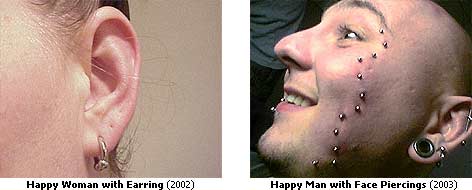
When does modification become mutilation? |
"Every good artist paints what he is ... The strangeness will wear off and I think we will discover the deeper meanings in modern art."– Jackson Pollock
I recently got the following question from a reporter in Seattle; variations on it are asked fairly regularly, and I think people tend to assume that their perception of “mutilation” (and just about everything else as well) is objective when it is in fact subjective. Anyway, the question:
Is there any point at which you would draw the line in body modification? To clarify, is there a line you wouldn’t cross and don’t feel others should either? A point at which you would say “Okay, that’s not modification. That’s mutilation.”
To me, the question seems strange. Let’s play Greek philosopher for a moment and imagine a dialogue between two people, Gerald and Charles, as they walk through an art gallery. They are in the abstract wing, looking at a series of Jackson Pollock paintings.

Gerald, the first man, points at The Key.
Gerald: Is that art?Charles: Yes, I think so. It invokes feelings in me and has meaning. I like looking at it… But that one, Number 8, it’s just scribbling. It does nothing for me. It’s not art, and I’d never hang something like that in my home.
Gerald: Perhaps you simply are unable to understand it due to your own shortcomings and life experiences. I see meaning in it, and I enjoy looking at it. It is art, and I’d be honoured to have it decorating my living room.
Charles: If you believe it is art, and I believe it is not, and each of us can experientially confirm our belief, then who is right?
Gerald: We both are.
Some things may really be defined only in the eye of the beholder. After all, some people don’t like chocolate. Some people do. Does that mean that we can definitively answer the question of “does chocolate taste good?” with a yes or a no? Of course not — the clear answer is “it depends on who’s eating it.”
Looking at it coldly, almost any change made to the body, even simple earrings, is mutilation. It is also modification. In this context the words mean effectively the same thing, one simply appends a condemnation of the act. Given that the interpretation of the modification (that is, “does it make me happy? has it improved my life?”) is up to the subject, I feel it is unreasonable for anyone to attach the label “mutilation” as long as they can answer those two questions affirmatively.
I posted this same question to the members of the iam.bmezine.com community, and on the whole the answer was an overwhelming “whatever makes you happy”:
“I think it all comes down to intent. If somebody wants to modify their body in a certain way and that’s what they want, who is to say that it is wrong? I don’t think it would be considered mutilation if they want it.”“The only line is the one that the individual draws personally. Hopefully anyone getting serious, extensive modifications has thought deeply about it and reflected within themselves. If they don’t feel the line has been crossed personally, there is no line. Hopefully, my line is not someone else’s line.“
– mal“One man’s treasure is another man’s junk! As long as you are making decisions for yourself and not forcing them on others, anything goes. Everyone needs to follow their own hearts and minds in their pursuits, but one also needs to accept responsibility for one’s actions, and the consequences, positive or otherwise.”
“To give an example, I would never consider amputation for myself, but I admire people who see that as a form of art and expression. I can appreciate their reasons behind it, and I don’t consider it to be mutilation for them, even though it would be if I did it.”
“I think the line is different for every person. I’m sure that I’ve done and continue to do a lot of things that most people would never do, but at the same time I wouldn’t cut my foot off… But mabye Joe would — that’s up to him and if he wants to do it, more power to him. It’s just not something I would do. Draw your own damn lines!”
“If what you do benefits you in positive manner spiritually and mentally and you are prepared for the implications, there isn’t a line. When I am branded, I am spiritually and mentally affected in a positive manner — I feel this within myself. Whatever others might think of my decision is unrelated to that truth. I do not feel I can draw lines for others, but I know my own personal limits. Knowing what is positive and negative for me; that is what matters.”
– Elysiat
That said, a number of people did point out that it was possible for a person to hurt themselves; that sometimes, even when a person desires something, their reasoning may be ultimately self destructive — that is, sacrificing one’s life to defend one’s family might be “good”, but sacrificing one’s life because someone called you “ugly” is not. Many readers recounted their own experiences with self-harm.
“I have ‘mods’ (scars) that were a result of what, at the time, was definitely mutilation… But, since then, I have begun to experiment with scarification and branding as a form of art and beauty, not as something to express all my hurt. I think it’s all highly personal, and up to each individual to decide… not for someone else to impose upon another person.”“It depends entirely on your motivation. If you are cutting yourself out of self-hate or loathing then it’s clearly harmful. If the motivations are positive then it’s a different story. Everyone has their own ‘line’ and we have no right to judge others based on what their line might be. Just because an act is physically harmful, doesn’t mean the result is.”
– punkass“When I was younger I was a self-cutter, and by no means was I attempting to modify my body. I was dealing with anger and frustration in the only way I knew how. Now I have many different mods that were painful to get, but were in no way related to emotional problems.”
– siogrrrl“It’s mutilation when the modification is done by an individual not in a sound state of mind… That is, incapable of understanding the full physical and/or social implications of the modification.”
A couple people pointed out that the line between self-harm and self-improvement may not lie only in the self. If a person chooses modifications that cripple them, even if the mods themselves make them happy, they may still place a burden on society. For example, does a self-amputee have the right to demand that their community pays for their prosthetics? Does a person who tattoos their face have the right to demand that if they are no longer “hireable” that the state provide them financial assistance?
“I think once they burden society around them it is going too far, but I don’t think it is ‘burdening society’ if some people just don’t like it.”– outsider“I draw the line with whatever won’t get me fired from work.”
– gorelord
My feeling is that if a modification is going to change the way you interact with society, that should of course be taken into consideration. We have the right to put extra burdens on ourselves, but not on others. Just because you like a body modification doesn’t mean that you have the right to take more from society than you put in.
All that said, I think Tankgirl gave perhaps the most relevant response:
I think a better question would be why do people in society in general think some of what we do is mutilation rather then modification?
It’s true — one really does have to wonder why some people are unable or unwilling to believe that different people might have different desires. After all, unless one takes the hardline stance that all mods are wrong (earrings and circumcision included), the hypocrisy should be clear. The pathology that goes into that closed-mindedness would be far more fascinating a study!

In any case, I hope it’s obvious that everyone has the right to define their own line and their own limits. How do you know for yourself when you’ve gone “far enough”? Since I keep bringing him up, I will use Jackson Pollock one last time. When he was asked how he knew when a painting was complete (they took a long time, sometimes years, to complete), he answered,
"How do you know when you're finished making love?"
My official answer to the initial question? “If a body modification activity makes the person who gets it happy, or it empowers or improves their life in some way, I will do everything I can to both help facilitate that process and defend their rights to enjoy life with it. That said, body modification is a serious and permanent act, and should not be taken lightly. The easiest way to be ‘mutilated’ is by acting without foresight. A person who enters body modification with a clear head and a clear heart will never be mutilated.”
So try not to mutilate yourself,

Shannon Larratt
BMEzine.com
PS. Shout-out to York University, Class of ’95 Bachelor of Fine Arts program… of course, I dropped out after a year to do my own thing!
 BME/News and Modblog highlight only a small fraction of what BME has to offer. Take our free tour and subscribe to BME for access to over 3 million body modification related photos, videos, and stories.
BME/News and Modblog highlight only a small fraction of what BME has to offer. Take our free tour and subscribe to BME for access to over 3 million body modification related photos, videos, and stories.